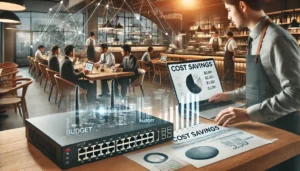Why Self Managed Networks Are Essential for Restaurants
- Phone: +1(833)PHX-Geek
- 712 H St NE Suite 1904 Washington, D.C. 20002
Are you looking to come to Toast POS? Follow this link to sign up and get a free quote from your local Toast Rep. They will come out to your restaurant, and give you a free, no obligation quote.
Introduction
In today's fast-paced restaurant environment, efficiency is paramount. Implementing a Self Managed Network can greatly enhance operational performance, allowing restaurant owners to tailor their network infrastructure to their specific needs. Unlike traditional managed networks, self-managed networks give restaurants complete control over their connectivity, enabling staff to troubleshoot and resolve issues swiftly, minimizing downtime and ensuring smooth service delivery. 
The flexibility of self-managed networks allows restaurants to optimize their bandwidth and prioritize crucial applications, such as point-of-sale systems and online ordering platforms. By actively managing their networks, restaurant operators can adjust settings and configurations in real-time, ensuring that customer interactions are seamless. This adaptability not only improves daily operations but also enhances the overall customer dining experience.
Moreover, self-managed networks enable restaurants to scale their operations effortlessly. As businesses expand, so do their networking needs. With a self-managed setup, restaurant owners can easily add devices and services without the need for external support, streamlining the growth process and maintaining efficiency at all levels of operation.
One of the most compelling reasons to choose a Self Managed Network is the potential for significant cost savings. By opting for self-management, restaurants can reduce expenses typically associated with employing external IT service providers. This can free up resources that can be allocated to other critical areas of the business, such as staff training or marketing initiatives.
 Additionally, with self-managed networks, restaurants can avoid the hidden costs of traditional managed services, such as monthly fees and long-term contracts. This cost transparency allows owners to budget more effectively, ensuring that they are not caught off guard by unexpected charges. The ability to control costs while maintaining robust network performance makes self-managed networks an attractive option for budget-conscious restaurant operators.
Additionally, with self-managed networks, restaurants can avoid the hidden costs of traditional managed services, such as monthly fees and long-term contracts. This cost transparency allows owners to budget more effectively, ensuring that they are not caught off guard by unexpected charges. The ability to control costs while maintaining robust network performance makes self-managed networks an attractive option for budget-conscious restaurant operators.
Furthermore, restaurants can leverage their existing hardware and software, reducing the need for expensive upgrades or new equipment purchases. This eco-friendly approach not only saves money but also minimizes electronic waste, aligning with sustainable business practices that are increasingly important to modern consumers.
Security is a top concern for restaurants, especially with the rise in cyber threats targeting the food service industry. A Self Managed Network offers enhanced security features that allow restaurant owners to implement customized security protocols tailored to their specific business needs.
By controlling their network, restaurant operators can monitor traffic patterns and identify vulnerabilities in real-time. This proactive approach to network security enables them to quickly address potential threats, safeguarding sensitive customer data and ensuring compliance with industry regulations. Additionally, self-managed networks can easily incorporate the latest security technologies, such as firewalls and intrusion detection systems, further bolstering their defenses against cyber attacks. 
Moreover, self-managed networks provide restaurant owners with the peace of mind that comes from knowing their data is protected. With direct control over their network security measures, they can instill confidence in customers that their information is handled with the utmost care, fostering trust and loyalty.
The control that comes with a Self Managed Network simplifies the management process for restaurant owners and their teams. With intuitive interfaces and user-friendly tools, staff can easily configure network settings and manage devices without extensive technical knowledge. This democratization of network management empowers all team members to contribute to maintaining network health, enhancing overall operational efficiency.
Additionally, self-managed networks facilitate seamless integration with other business systems, such as inventory management and customer relationship management (CRM) tools. This interconnectedness allows for smoother data flow and communication between systems, resulting in improved decision-making and operational insights.
 Finally, the ability to easily adjust network settings based on real-time needs ensures that restaurants can adapt quickly to changing circumstances. Whether it's accommodating fluctuations in customer traffic or integrating new technology, a self-managed network provides the flexibility necessary for success in the ever-evolving restaurant landscape.
Finally, the ability to easily adjust network settings based on real-time needs ensures that restaurants can adapt quickly to changing circumstances. Whether it's accommodating fluctuations in customer traffic or integrating new technology, a self-managed network provides the flexibility necessary for success in the ever-evolving restaurant landscape.
Conclusion
In conclusion, choosing a Self Managed Network for your restaurant brings numerous advantages, including enhanced efficiency, cost savings, improved security, and simplified management. By embracing this approach, restaurant owners can create an agile, resilient infrastructure that supports their business objectives, ultimately leading to a more successful and sustainable operation.